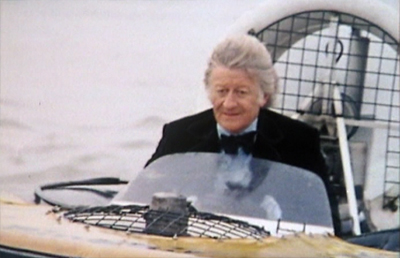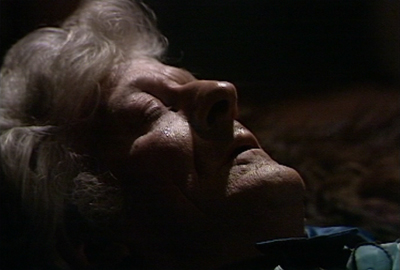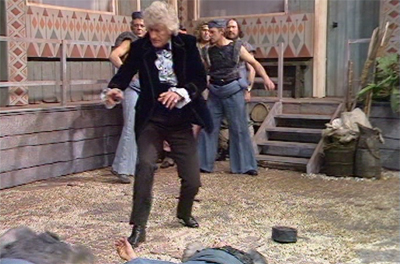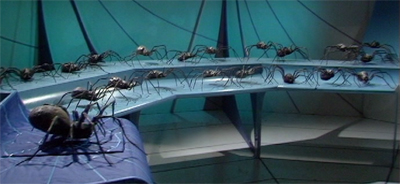To celebrate the fiftieth anniversary of the longest-running science-fiction show in the world, I’ll be taking weekly looks at some of my own personal favourite stories and arcs, from the old and new series, with a view to encapsulating the sublime, the clever and the fiendishly odd of the BBC’s Doctor Who.
Planet of the Spiders originally aired in 1974.
Oh dear, this is getting monotonous.
– the Doctor sums it up
Jon Pertwee’s final season is a real shame. The actor was, at the time, the actor who had served the longest period of time in the lead role. Starring as the Doctor for five years, and appearing as the face of the show during an era of renewal and reinvention, the actor deserved a much strong swansong. The year had started relatively strong with The Time Warrior, which I would rank among the best stories of the Pertwee era. However, every story after that just felt like it was treading water, revisiting old triumphs while biding time until the finalé. We had a Dalek episode in Death to the Daleks. We had a Malcolm Hulke lizard story with Invasion of the Dinosaurs. We had an off-world social commentary story in The Monster of Peladon. All felt like the cast and crew were just worn out, just going through the motions.
Sadly, Planet of the Spiders continues this trend, rather than bucking it.
It’s a padded and gratuitous final adventure for Pertwee’s Doctor that threatens to drown in the conventions of the era rather than affectionately celebrating them. It’s quite sad that one winds up watching Jon Pertwee’s final story so that he can just die and we can get to Robot, which actually feels like a much more appropriate (though far from perfect) cap to the Pertwee era. Only, you know, without Pertwee.
So we’re stuck with what we have. Barring perhaps The Ultimate Foe or Time and the Rani, depending on how you define the departure of Colin Baker and the Sixth Doctor, Planet of the Spiders stands as the weakest regeneration story of the classic series. While many of those era-ending stories weren’t anywhere near the best stories of their era, at least they possessed some interesting concepts and ideas, counting on something more than the loyalty of the audience to make it to the end of the show.
Okay. Maybe Jon Pertwee and Barry Letts had earned the right to do Planet of the Spiders. They had, after all, been working on the show for half-a-decade. There comes a point where a creator and an actor might be due a little indulgence. And Planet of the Spiders is packed with nods towards the preferences of the leading actor and the producer, with very little consideration given to what the audience might actually want.
Pertwee was perhaps the most physical of Doctors, and he was – rather famously – fond of cars. So Planet of the Spiders features an incredibly gratuitous (and pointless) chase sequence that end with the villain mysteriously disappearing. It was nice of him to indulge Pertwee’s preferences before he vanished away, I suppose. The scene is a showcase of the rather surreal collection of theme vehicles that Pertwee’s Doctor had assembled. Clearly not to be outdone by Adam West’s Batman!, the Doctor had two themed land-vehicles, and the sequence sees him driving both a tiny helicopter and a hovercraft.
It is a sequence that seems to have been included just to placate Pertwee, who was undeniably fond of such touches. And, to be fair, there’s nothing wrong with a bit of popcorn entertainment. I enjoy a nice car chase every now and then. Of course, it is quite difficult to film an exciting an compelling car chase on the budget of Doctor Who in 1974. And it’s particularly frustrating when the sequence is split across two episodes and makes absolutely no difference to how anything plays out.
I think that’s the real problem with the touches that were inserted to appeal to Pertwee’s style of Doctor Who. He fight sequences and his car chases don’t ever actually seem to be important to the grand scheme of the plot. It’s as if somebody mapped out the episode and then tried to shoehorn in these little nods towards Pertwee’s own preferences. So the Doctor is always beating up guards, only to be overpowered when the writers and the director think the scene has gone on long enough.
The episode also plays to Letts’ interests. Throughout the producer’s tenure, the show has embraced Buddhist and New Age philosophy to varying degrees of success. And, to be fair, conceptualising regeneration as a process akin to Buddhist reincarnation is quite a clever idea. In fact, I suspect that – coupled with Patrick Troughton’s palpable fear in The War Games – this notion of regeneration as a form of spiritual rebirth is what firmly cemented the process as a form of death. It is just death immediately followed by a resurrection.
The problem is that Planet of the Spiders is ridiculously heavy-handed in it symbolism. The plots splits its attention between modern-day Earth and distant Metebelis III, but all the Buddhist philosophy feels like mere window-dressing for the inevitable regeneration. There’s really no reason for it to be involved with the plot, except that Letts wants to tie the Doctor’s rebirth to the theory of reincarnation.
Letts was a practising Buddhist, and hints of his belief system feed into his run on the show, but the problem with Planet of the Spiders is that it all feels so superficial. Because this is Jon Pertwee’s final story, all these elements need to pay off. We even join the disgraced Mike Yates at the Buddhist sanctuary, because… because… Well, according to Yates, “I mean, like you said, everybody’s going on about meditation of one sort or another, so I thought I’d have a crack at it.”
It feels like lazy plotting, as if the writers had a list of stuff they wanted to include, with no regard for how it would fit together. Mike Yates must be there, allowed to resign quietly following an attempted genocide (which is sort of glossed over here). And there must be some heavy Buddhist elements. So, I don’t know, let’s just put the two together because… why not, really? It might make for a competent tribute, but it doesn’t make for a compelling plot.
That said, there is something very weird about the character of Cho-je. It isn’t just that he wanders around uttering foreshadowing nonsense (“the old man must die and the new man will discover to his inexpressible joy that he has never existed”), but the character speaks as if affecting a particularly dodgy Asian accent. We discover that he is “a projection” of K’anpo, but that doesn’t explain his accent. That said, it does seem to foreshadow the use of “the Watcher” in Logopolis.
Anyway, the adventure features a lot of seventies New Age pseudo-science that this era of the show loved so much. This is, after all, a version of the show that took a trip to Atlantis. Here, the Doctor encounters an actual telekinetic. He tries to calm the man by assuring that such powers are present in everybody. It’s just that we don’t realise it. Or, possibly, take the right consciousness-expanding medication. “Mister Clegg, your powers may seem to be extraordinary, but I assure you that they lie dormant in everyone. They’re perfectly natural.”
Indeed, the whole plot hinges on a crystal that Jo convenient mails back to the Doctor at the start of the episode. There’s a lot of that sort of plotting here – apparently we should acknowledge these vast contrivances as “fate” rather than “lazy writing.” Anyway, the Doctor receives the crystal just as things start going crazy, and it’s discovered that the eponymous spiders plan to use the crystal to alter the structure of the universe itself. Because… why not?
Discussing how the spiders magically evolved from a single spider on board a crashed colony ship, Sabor tells Sarah Jane, “There are blue crystals there. They have strange powers.” He adds, “Ah, then you must know that these crystals can enlarge the mind.” It is clear a nod to “New Age crystal power.” It’s actually one of the least cringeworthy plot elements of the episode, and the one that feels like a genuine attempt to riff off the philosophy of the Letts era. The notion of an alien crystal that could actually do what New Age beliefs suggest an ordinary crystal could do fits quite well with the era’s mysticism-as-aliens motif.
However, perhaps the biggest problem with the episode is the climax. It’s a moment that feels strangely out of place on Doctor Who, especially a version of the show heavily influenced by Buddhism. Apparently this whole situation is the Doctor’s fault. It’s his mistake and his sin which led to this, and the episode hints that this sin is why the Third Doctor must die. Which is a very Christian way approaching death and resurrection, despite the Buddhist trappings of the episode – he died for his sins and was born again.
Anyway, apparently the Third Doctor’s cardinal sin was greed… for knowledge.
We are all apt to surrender ourselves to domination. Even the strongest of us.
Do you mean me?
Not all spiders sit on the back.
Oh, I don’t understand. You’re not saying they’ve taken over the Doctor, are you?
Oh no, Sarah, no. No, he’s talking about my greed.
Greed? You?
Yes, my greed for knowledge, for information. He’s saying that all this is basically my fault. If I hadn’t taken the crystal in the first place… I know who you are now.
Some religions consider knowledge a sin. Again, it’s a very Christian image – the apple in the Garden of Eden. However, it seems weird for a show embracing Buddhist philosophy to condemn the pursuit of scientific knowledge.
Indeed, it seems especially hypocritical to suggest that the Third Doctor’s cardinal sin is “greed for knowledge” and that this merits the character’s death. Every iteration of the character has a thirst for knowledge. That’s why the Doctor stole the TARDIS, and that’s why he would never give it back. If anything, the Third Doctor is less greedy than his other iterations. Even after his exile is lifted and he’s free to return to the cosmos to continue pursuing knowledge, he anchors himself to Earth with the U.N.I.T. family. No other Doctor would tied down as much, with others devoting themselves much more to travelling and learning for its own sake.
It’s not that the Third Doctor is perfect. He certainly has flaws. I’d argue this version of the character has more pride than any of this other iterations – with the possible exception of the Fourth or Tenth Doctors. His value system is markedly different than any other iteration of the character. Despite his sometimes rough exterior, the Third Doctor was more likely to integrate with the establishment than other iteration. Indeed, Malcolm Hulke seemed to make that criticism in Invasion of the Dinosaurs.
It feels like Planet of the Spiders almost doesn’t understand the Third Doctor and this era of the show at all. It tries to wrap up the era with a few of the superficial trappings of the last half-decade. There’s Buddhism, there’s Venusian Aikido, there’s extended car chases and dodgy CSO. However, there’s none of the sense of family that defined this era of the show. There’s no sense of the Doctor as part of the establishment. If anything, the Third Doctor’s biggest sin is that he didn’t venture out into the universe enough, and it feels like Planet of the Spiders misrepresents that.
There’s also the fact that the episode is just a very shabby production. The guest cast on Metebelis III is especially terrible, the kind of acting that only really belongs on cruel parodies of Doctor Who and not the show itself. The production team seem to have realised how grossly under-plotted the whole thing was, because there are extended recaps opening several of the episodes. The fourth part, for example, replays a gratuitous exchange of fisticuffs, while the final part seems to recycle a solid three minutes of footage.
Even the TARDIS dematerialisation seems sloppy at the end of the third act, as if the camera had been moved between shots, creating a blurred effect. It’s something that must have been easy to spot and would have been relatively simple to fix, but it just feels like everybody involved in Planet of the Spiders was just so exhausted at that point that they couldn’t even muster the energy to fix that. As an aside, though, I kinda like that the spiders webbed pillows for Sarah Jane and the Doctor. It’s always nice to be held captive by considerate aliens that plan to eat you.
The spiders themselves should be fun, and they almost are. The puppets aren’t the best thing ever to appear on Doctor Who, but they’re not the worst. The image of the spider stuck to Sarah Jane’s back is delightfully effective, despite its simplicity. The problem, however, is that the episode features long a pointless scenes of these puppets plotting, interacting and providing laboured exposition. Even the Daleks couldn’t look impressive doing that, so what chance to a bunch of dodgy spider puppets have? It doesn’t help that the script tries its hardest to give them the most clichéd dialogue imaginable.
Planet of the Spiders is a massive waste. It’s a shame that Pertwee’s time on the show ended like this. It just feels like it misunderstands what worked and what didn’t work about the Jon Pertee era. While Robot is the weakest episode of the next season, it would at least have proved a more fitting swansong.
You might be interested in our reviews of the eleventh season of the classic television show:
- The Time Warrior
- Invasion of the Dinosaurs
- Death to the Daleks
- The Monster of Peladon
- Planet of the Spiders
Filed under: Television | Tagged: arts, Barry Letts, bbc, Brigadier, Dalek, doctor, DoctorWho, Earth, Jon Pertwee, Mike Yates, Online Writing, Pertwee, Planet of the Spiders, regeneration, russell t. davies, Sarah Jane Smith, science fiction, Sixth Doctor, Spider, tardis, Third Doctor |
































Counterpoint: Planet of the Spiders is actually super awesome! A couple years ago, I tried to find a DVD of that story for less than $60. Couldn’t manage it, so can’t wait for the Blu-ray set. Hopefully, in 2021!
I believe the issue with season eleven on blu ray is Invasion of the Dinosaurs which had to be remastered from black and white, and which doesn’t scale upwards as well as they’d hope. So it looks like they’ll have to essentially remaster it from scratch.